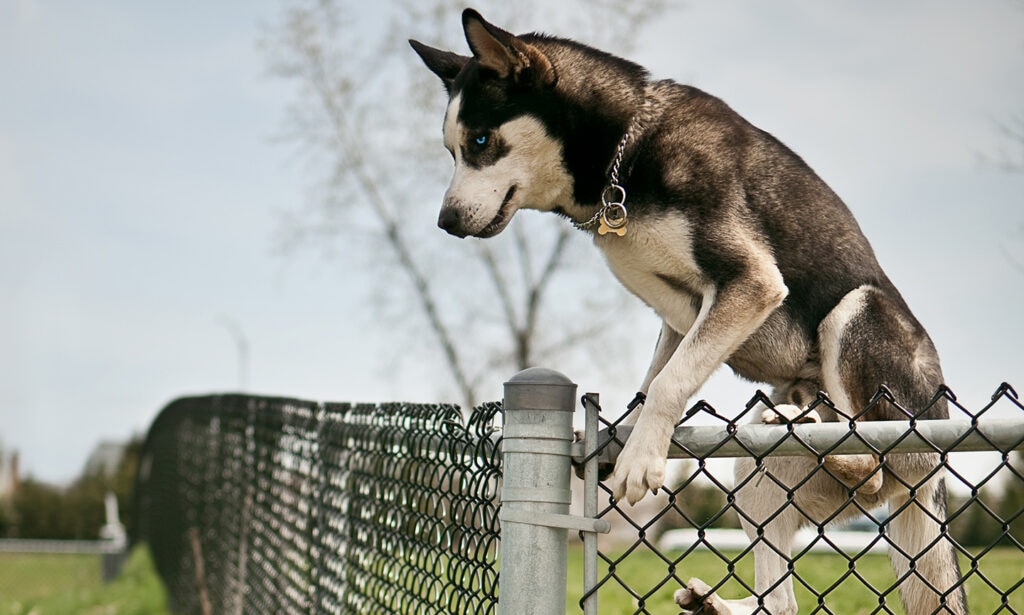Husky behavior problems often stem from high energy levels and a strong prey drive. Proper training and socialization can help manage these issues effectively.
Siberian Huskies are energetic and intelligent dogs, known for their stunning appearance and playful nature. Their strong instincts can lead to various behavior problems, making training essential. Common issues include excessive barking, digging, and escaping. These behaviors often arise from boredom or lack of exercise.
Understanding the root causes is crucial for addressing and correcting these challenges. Effective training methods emphasize positive reinforcement and consistency. Socialization with other dogs and people can also mitigate many behavior problems. With the right approach, owners can channel their Husky’s energy into productive activities, resulting in a well-behaved and happy companion.

Credit: www.amazon.com
Introduction To Husky Behavior
Huskies are known for their unique traits and lively personalities. Understanding their behavior is key to ensuring a happy relationship. Many owners face challenges due to common misunderstandings about these dogs.
Characteristics Unique To Huskies
Huskies possess several distinct characteristics:
- High Energy: They need lots of exercise.
- Independent Nature: Huskies often think for themselves.
- Vocalization: They love to “talk” and howl.
- Playful Spirit: They enjoy games and interaction.
These traits can lead to specific behavior problems. Owners should be prepared for their dog’s strong-willed demeanor.
Common Misconceptions
Many people have misconceptions about Huskies. Here are a few:
| Misconception | Truth |
|---|---|
| Huskies are easy to train. | They require consistent and patient training. |
| Huskies are aggressive. | They are friendly but can be stubborn. |
| Huskies can be left alone. | They thrive on companionship and can get anxious. |
Understanding these misconceptions helps owners manage their Husky’s behavior better.

Credit: be.chewy.com
Dealing With Stubbornness
Huskies are known for their independent nature. This can lead to stubborn behavior. Understanding how to manage this trait is essential. With the right techniques, you can encourage better behavior.
Positive Reinforcement Techniques
Positive reinforcement builds trust and encourages good habits. Here are some effective techniques:
- Use Treats: Offer a small treat for good behavior.
- Praise: Use enthusiastic praise when they follow commands.
- Playtime: Reward them with playtime after completing a task.
Focus on rewarding your Husky, not punishing them. This method works better for their stubborn nature.
Consistency Is Key
Being consistent helps your Husky understand what you expect. Here are some tips for consistency:
- Use the same commands every time.
- Follow a routine for feeding, walks, and training.
- Ensure all family members use the same rules.
By maintaining consistency, you help your Husky learn faster. They thrive on routine and clear expectations.
Excessive Howling And Barking
Huskies are known for their vocal nature. Sometimes, they can howl and bark excessively. This behavior can frustrate owners and neighbors alike. Understanding why this happens is essential for finding solutions.
Identifying The Cause
Finding the root of the problem is the first step. Here are common causes of excessive howling and barking:
- Loneliness: Huskies are social dogs. They may bark when they feel isolated.
- Attention-seeking: Your Husky might want your attention. Barking can be a way to get noticed.
- Alerting: Huskies are natural protectors. They bark to alert you about strangers or noises.
- Stress or Anxiety: Changes in environment can cause stress. This may lead to excessive vocalizations.
Effective Communication
Communicating with your Husky helps reduce barking. Here are some effective strategies:
- Training: Teach your Husky basic commands. Use positive reinforcement for good behavior.
- Socialization: Expose your Husky to different environments. This helps them feel secure.
- Exercise: Provide daily physical activity. A tired Husky is less likely to bark.
- Calm Environment: Reduce stressors at home. Create a peaceful space for your pet.
Understanding your Husky’s needs is vital. With patience and consistency, excessive howling and barking can be managed.
Managing High Energy Levels
Huskies are known for their boundless energy. Proper management of this energy is crucial. Without enough activity, they can develop behavior problems. Understanding their needs helps keep them happy and healthy.
Adequate Exercise Routines
Regular exercise is vital for Huskies. They require at least 1-2 hours of activity each day. Here are some effective ways to ensure they get enough exercise:
- Daily walks: Aim for 30-60 minutes.
- Running: Huskies excel in running. Take them on jogs.
- Playtime: Engage in games like fetch or tug-of-war.
- Dog parks: Socialize them with other dogs.
Creating a schedule helps maintain consistency. Mix different activities to keep them excited.
Mental Stimulation Activities
Mental activities are just as important as physical ones. Huskies are intelligent and need challenges. Here are some ideas for mental stimulation:
- Puzzle toys: These keep their minds active.
- Training sessions: Teach them new commands regularly.
- Interactive games: Use toys that require problem-solving.
- Hide-and-seek: Hide treats around the house for them to find.
Rotate these activities to keep things fresh. A well-stimulated Husky is a happy Husky.
Preventing Escape Attempts
Huskies are known for their adventurous spirit. They often try to escape. Understanding how to prevent this behavior is crucial. It keeps your dog safe and your home secure.
Securing Your Home
Start by ensuring your home is escape-proof. Huskies are strong and clever. Here are some tips:
- Check fences for gaps or holes.
- Install a tall fence, at least six feet high.
- Use buried fencing to deter digging.
- Secure windows and doors tightly.
- Lock gates when not in use.
Consider these materials for your fence:
| Material | Advantages |
|---|---|
| Wood | Strong and durable. |
| Chain Link | Cost-effective and sturdy. |
| PVC | Weather-resistant and easy to maintain. |
Training For Recall
Training your Husky for recall is essential. This skill helps keep them safe. Use these tips for effective training:
- Start in a quiet area with few distractions.
- Use a consistent command like “come.”
- Reward them with treats for coming back.
- Practice regularly to reinforce the behavior.
- Gradually increase distractions as they improve.
Remember, patience is key. Training takes time. Make it fun to keep your Husky engaged.

Credit: www.amazon.com
Addressing Aggression
Aggression in Huskies can be alarming. Understanding this behavior is essential for a happy home. Many factors contribute to aggression. Identifying the triggers can help in managing this issue.
Understanding Triggers
Huskies can show aggression for various reasons. Common triggers include:
- Fear: A scared dog may act defensively.
- Territoriality: Protecting their space can lead to aggressive actions.
- Frustration: Lack of exercise or stimulation can cause pent-up energy.
- Socialization: Insufficient interaction with other dogs or people can create fear.
Recognizing these triggers can help prevent aggressive behavior. Observe your dog’s body language. Signs of aggression include:
- Growling or barking
- Stiff body posture
- Showing teeth
Professional Training And Socialization
Seeking professional help is vital. Experienced trainers can guide you in managing aggression. Training focuses on positive reinforcement methods. This builds trust and reduces fear.
Socialization is equally important. Expose your Husky to different environments, people, and animals. This helps them become more comfortable. Here’s how to socialize your Husky effectively:
- Start at a young age.
- Introduce them to other dogs in a controlled setting.
- Take short trips to parks or busy areas.
- Encourage positive interactions with strangers.
Consistent training and socialization can greatly reduce aggression. A well-adjusted Husky is a joy to have.
Solving Destructive Chewing
Huskies are known for their energy and curiosity. This can lead to destructive chewing. Understanding this behavior helps in finding effective solutions. Providing proper outlets for their chewing instinct is crucial. Here are some strategies to manage this behavior.
Providing Appropriate Chew Toys
Choosing the right chew toys is essential. Huskies need toys that can withstand their strong jaws. Look for toys made from durable materials. Here are some great options:
- Rubber toys
- Rope toys
- Hard nylon bones
- Interactive toys
Rotate toys to keep them interesting. Avoid toys with small parts that can break off. Always supervise your husky with new toys. This ensures they stay safe while chewing.
Redirecting Chewing Behavior
Redirecting your husky’s chewing is important. Teach them what is acceptable to chew. Use these techniques for effective redirection:
- Identify the items they chew.
- Provide a chew toy immediately.
- Praise your husky when they chew the toy.
- Remove tempting items from reach.
Consistency is key. Reinforce positive behavior with treats and praise. Keep your home free of items that attract chewing. This helps your husky learn what is off-limits.
| Chew Toy Type | Durability | Recommended for |
|---|---|---|
| Rubber Toys | High | Aggressive chewers |
| Rope Toys | Medium | Playtime and tugging |
| Nylon Bones | High | Long-lasting chewing |
| Interactive Toys | Variable | Mental stimulation |
Nutrition And Diet
Proper nutrition and diet play a crucial role in managing Husky behavior problems. A balanced diet helps maintain energy levels and overall health. Inadequate nutrition can lead to behavioral issues. Understanding what to feed your Husky is key to happy living.
Impact On Behavior
The right diet can significantly affect your Husky’s behavior. Nutritional deficiencies can cause:
- Hyperactivity
- Aggression
- Destructive behavior
- Separation anxiety
A well-nourished Husky tends to be calm and focused. Proper nutrition supports brain function and emotional stability. Focus on high-quality ingredients for the best results.
Recommended Foods For Huskies
Choosing the right food for your Husky is essential. Here are some recommended food types:
| Food Type | Benefits |
|---|---|
| High-protein kibble | Supports muscle growth and energy |
| Wet food | Increases hydration and palatability |
| Raw diet | Offers natural nutrients and enzymes |
| Fish oil | Improves coat health and reduces inflammation |
Consider these tips for feeding your Husky:
- Choose high-quality ingredients.
- Avoid fillers like corn and soy.
- Monitor portion sizes to prevent obesity.
- Consult a vet for specific dietary needs.
Feeding your Husky right enhances their behavior and well-being. A proper diet leads to a happy, healthy dog.
Frequently Asked Questions
What Are Common Husky Behavior Problems?
Huskies often face issues like separation anxiety, excessive barking, and stubbornness, which can be managed with training and socialization.
Why Does My Husky Chew Everything?
Destructive chewing is usually a result of boredom or anxiety. Providing toys and regular exercise can help alleviate this behavior.
How To Stop A Husky From Barking?
Training commands, socialization, and mental stimulation can effectively reduce excessive barking in Huskies.
Why Is My Husky So Stubborn?
Huskies are independent and intelligent, leading to stubbornness. Consistent training and positive reinforcement are key to overcoming this trait.
How Can I Train My Husky Effectively?
Use positive reinforcement, keep training sessions short, and be patient. Consistency is essential for effective Husky training.
Conclusion
Husky behavior problems can be challenging, but understanding their needs is crucial. Consistent training and socialization can help address these issues. Regular exercise is essential for their well-being. By being patient and proactive, you can foster a happy and well-adjusted Husky.
Remember, a well-cared-for dog is a joy to have.
